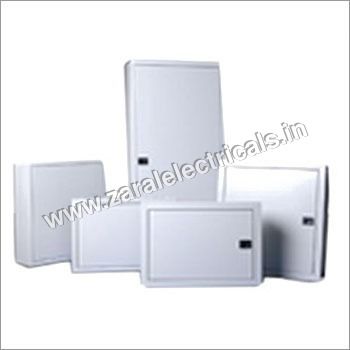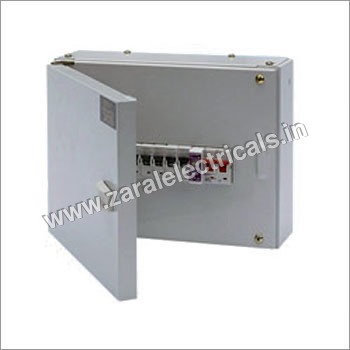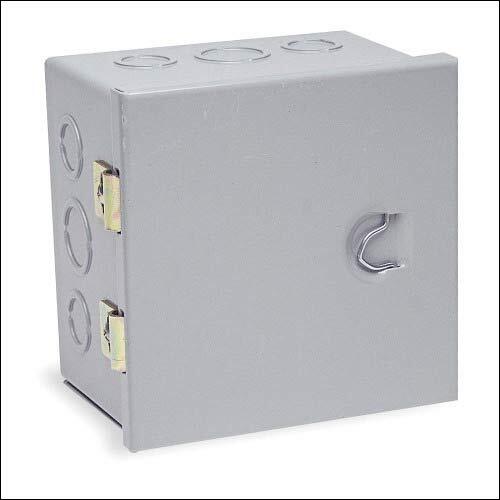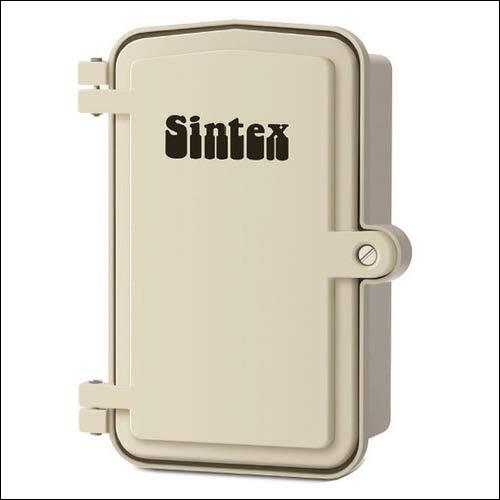About Bus Bar Box
Offered in the business sector at the most sensible rate, the Bus Bar Boxes produced by us is generally acclaimed and requested. Made as per industry set industry rules, its quality never weakens. Also, the finest crude materials and propelled apparatus connected in its making, gives the item high solidness, dimensional exactness and imperviousness to consumption. These boxes are fabricated with highly durable matter, and complete resistant to corrosion. The robustness and flexibility of these products are main features that are appreciated all over the world.
Electrical Bus Bar Boxes Features:
1. Superior sturdiness
2. Commendable durability
3. Resistance to corrosion
4. Affordable price
Bus Bar Box Applications:
1. Electrical Distribution: Bus bar boxes are commonly used in electrical distribution systems for distributing power from a main source to various circuits or loads within a building or facility. They provide a centralized point for connecting multiple electrical circuits, making it easier to manage and control power distribution.
2. Power Generation: In power generation facilities such as power plants or renewable energy installations, bus bar boxes are used to distribute electricity generated by turbines, solar panels, wind turbines, or other sources to the grid or to different parts of the facility.
3. Industrial Automation: Bus bar boxes play a crucial role in industrial automation systems, where they facilitate the distribution of power to various machinery, equipment, and control devices. They help streamline the wiring and connectivity of complex automation setups, improving efficiency and reliability.
4. Data Centers: Data centers rely on bus bar boxes to distribute power to servers, networking equipment, cooling systems, and other critical infrastructure components. They provide a compact and efficient solution for managing power distribution within the data center environment, ensuring continuous operation and minimal downtime.
5. Renewable Energy Systems: In renewable energy systems such as solar farms or wind farms, bus bar boxes are used to collect and distribute power generated by multiple solar panels or wind turbines. They help consolidate the electrical connections, simplify maintenance, and optimize the performance of the renewable energy installation.
6. Telecommunications: Telecommunication networks require reliable power distribution systems to ensure uninterrupted operation of communication equipment such as switches, routers, and transmission towers. Bus bar boxes are employed to efficiently distribute power to these critical components, supporting reliable communication services.
7. Transportation: In transportation systems such as railways or electric vehicles (EVs), bus bar boxes are used to distribute power to propulsion systems, lighting systems, HVAC (Heating, Ventilation, and Air Conditioning) systems, and other electrical components. They help ensure efficient and safe operation of transportation vehicles and infrastructure.
8. Marine Applications: Bus bar boxes find applications in marine environments, including ships and offshore platforms, where they are used to distribute power to various electrical systems onboard, such as propulsion systems, navigation equipment, lighting, and communication systems.
9. HVAC Systems: Heating, ventilation, and air conditioning (HVAC) systems in commercial and industrial buildings often utilize bus bar boxes to distribute power to motors, fans, pumps, and other HVAC components efficiently.
10. Renovation and Retrofitting: Bus bar boxes are also used in renovation and retrofitting projects to upgrade or expand existing electrical systems. They provide a convenient solution for integrating new circuits or equipment into the existing infrastructure while ensuring compliance with safety and regulatory standards.
Bus Bar Box FAQ:
Q. What are the main components of a bus bar box?
Ans: The main components of a bus bar box typically include the enclosure or housing, bus bars (usually made of copper or aluminum), terminal blocks or connectors for connecting incoming and outgoing wires, insulating materials, and protective covers or panels.
Q. What are the advantages of using a bus bar box?
Ans: Using a bus bar box offers several advantages, including simplified wiring and installation, improved electrical system organization, reduced space requirements, enhanced safety through insulation and protection, easier maintenance and troubleshooting, and increased flexibility for system expansion or modifications.
Q. Where are bus bar boxes commonly used?
Ans: These boxes are commonly used in various applications such as electrical distribution systems in buildings, industrial automation, power generation facilities, data centers, renewable energy systems, telecommunications, transportation vehicles, marine environments, HVAC systems, and renovation or retrofitting projects.
Q. What types of bus bar configurations are available?
Ans: Bus bar boxes may feature different configurations depending on the specific application and requirements. Common configurations include single-phase or three-phase configurations, horizontal or vertical layouts, various ampacity ratings, and options for customization such as different numbers of bus bars and terminal connections.
Q. How do I select the right bus bar box for my application?
Ans: When selecting a bus bar box, consider factors such as the voltage and current requirements of your electrical system, the number of circuits or loads to be connected, available space for installation, environmental conditions (such as temperature and humidity), required safety certifications, and any specific customization or features needed for your application.
Q. Are there safety considerations when using bus bar boxes?
Ans: Yes, safety is crucial when working with electrical systems and bus bar boxes. Ensure that the box and components are properly insulated, rated for the voltage and current levels involved, and installed according to manufacturer instructions and relevant electrical codes and standards. Additionally, follow proper safety practices such as de-energizing circuits before installation or maintenance work, using appropriate personal protective equipment, and avoiding overloading or overheating of the system.
Q. Can bus bar boxes be customized for specific requirements?
Ans: Yes, many bus bar box manufacturers offer customization options to tailor the enclosure size, bus bar configuration, terminal types, mounting options, and other features to meet specific application requirements. Customization may involve consultation with the manufacturer or distributor to ensure that the box meets the desired specifications and standards.
Q. How do I install and maintain a bus bar box?
Ans: Installation and maintenance procedures for bus bar boxes vary depending on the specific model and application. Refer to the manufacturers instructions and guidelines for proper installation, wiring, and maintenance practices. Regular inspections, cleaning, and testing of connections and components are essential to ensure safe and reliable operation over time.
Superior Material and ProtectionConstructed from premium stainless steel and finished with a protective cream paint, our Bus Bar Box ensures longevity and resistance to corrosion. With an IP55 protection level, it securely guards internal components from dust and water splashes, making it ideal for challenging environments often found in industrial and commercial settings.
Versatile Thickness and CustomizationAccommodating a wide range of thicknesses from 0.2 to 25 mm, our Bus Bar Box can be tailored to fit specific power distribution needs. This flexibility allows for safer energy management, supporting various current ratings and installation requirements within both small and large-scale projects.
FAQs of Bus Bar Box:
Q: How is the Bus Bar Box installed in electrical systems?
A: The Bus Bar Box is typically mounted on walls or within panels using secure brackets. Its design allows for straightforward integration with existing wiring, ensuring safety and reliability during electrical distribution.
Q: What advantages does the IP55 protection level provide?
A: The IP55 protection rating safeguards the Bus Bar Box against dust ingress and water jets, ensuring the internal components remain protected in harsh industrial or outdoor environments. This enhances the safety and durability of your electrical systems.
Q: When should I opt for a bus bar box with a thickness range of 0.2 to 25 mm?
A: This thickness range offers flexibility based on the current-carrying requirements of your installation. Thinner bars are suited for lower currents, while thicker options handle higher loads, ensuring suitability for a wide spectrum of electrical applications.
Q: Where can this Bus Bar Box be used effectively?
A: The Bus Bar Box is designed for industrial, commercial, and large residential settings where robust electrical distribution is essential. Its properties make it ideal for factories, warehouses, and commercial complexes.
Q: What is the process used for the boxs surface treatment?
A: The stainless steel bus bar box undergoes a painting process using durable, high-quality paints to achieve a cream-colored finish. This treatment enhances corrosion resistance and gives the enclosure a clean, attractive look.
Q: How does stainless steel material benefit the bus bar box?
A: Stainless steel provides excellent resistance to corrosion, high strength, and longevity. This ensures the bus bar box remains reliable, even in environments prone to moisture or chemical exposure.
Q: What are the key uses of this Bus Bar Box in electrical setups?
A: The Bus Bar Box is primarily used for organizing and protecting busbar connections, facilitating safe and efficient power distribution. It helps prevent accidental contact and electrical faults, promoting overall system reliability.
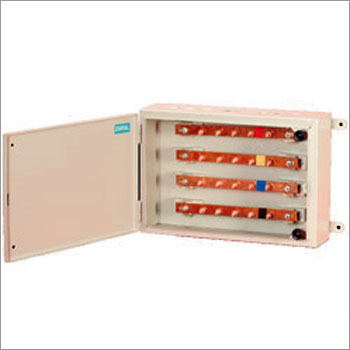
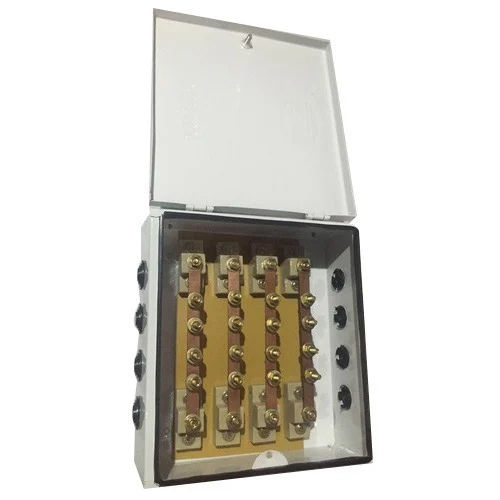



 Send Inquiry
Send Inquiry
